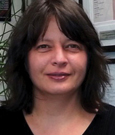In 1999, Kornelia Polyak, MD, PhD, of the Dana-Farber Cancer Institute, received a Career Development Award from the Conquer Cancer Foundation for her project, “Isolation of Tumor Suppressor Genes Inactivated in DCIS of the Breast.”
“The Career Development Award got me started,” she said. “When you’re starting out, it’s so good to feel you can accomplish something and get funding for your ideas. As a junior person, to know that someone appreciates your research and efforts—it’s a positive feeling.”
Seeking Solutions to a Challenging Clinical Problem
Dr. Polyak was inspired to research ductal carcinoma in situ (DCIS) in 1997 after reading Ductal Carcinoma in Situ of the Breast, by Melvin J. Silverstein, MD. “I read that book, and I realized that no one seemed to understand what DCIS was,” Dr. Polyak said. “I realized it was a huge clinical problem and a challenging scientific problem.”
For the CDA project, “we wanted to identify genes that were important to the activation of DCIS,” Dr. Polyak said. “What are the gatekeeping mutations? What are the genes that are really important for breast cancers to start? To understand that, you have to study early lesions.”
Through the CDA project, Dr. Polyak and colleagues discovered that HIN1, a novel breast tumor suppressor gene at the time, was the first gene function lost in a majority of breast cancers. The CDA provided Dr. Polyak with enough preliminary data to apply for a National Institutes of Health (NIH) RO1 grant, which was funded, allowing her to continue her research on DCIS.
In a later study published in Cancer Cell in 2004, Dr. Polyak and colleagues showed that the microenvironment within the breast was already changing in patients with DCIS.1 This paper became one of the most cited papers in Cancer Cell in 2004 and altered the way the oncology community thought about the disease, she said.2
Paying It Forward
Dr. Polyak has continued the line of mentoring that began with her relationship with Bert Vogelstein, MD, in 1999. “An undergraduate who was in my lab 10 years ago became a breast oncologist. She just wrote to me saying that the experience of being in my lab made her want to pursue this career path. There’s a limit to what we can do in our lab and our lifetimes, and it’s important to continue to have an impact.”
The Conquer Cancer Foundation needs your help to support future research leaders like Dr. Polyak. Visit the Conquer Cancer Foundation website to make a donation and learn more. ■
References
1. Allinen M, Beroukhim R, Cai L, et al: Molecular characterization of the tumor microenvironment in breast cancer. Cancer Cell 6: 17–32, 2004.
2. Looking Back. Cancer Cell. Available at http://www.cell.com/cancer-cell/10thanniversary. Accessed December 18, 2013.
Selected portions reprinted from ASCO Connection Online Exclusive. © American Society of Clinical Oncology. Support from 1999 CDA Launches Dr. Kornelia Polyak’s Quest to Advance Understanding of Ductal Carcinoma in Situ of the Breast. ASCO Connection. January 3, 2014. http://connection.asco.org. All rights reserved.


